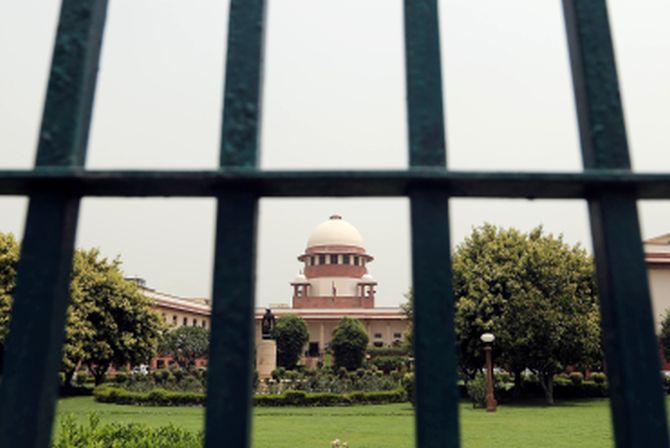Even aside from the Aadhaar scheme and legislation, the SC's decision by itself will substantially alter the landscape of fundamental rights, how they are interpreted, and how they are enforced, says Rahul Narayan.

The Supreme Court decision on the right to privacy is a ringing endorsement of human dignity and liberty and surely merits mention as one of the great decisions on civil liberties and fundamental rights.
In concurring judgments that are lucid, vigorously reasoned, well-researched, and moving, the Supreme Court has laid out unanswerable rationales for the recognition of the inalienable right to privacy in our Constitution and has persuasively rejected each objection to the same put forward by the government and by the Unique Identification Authority of India.
In doing so, the court has once again proven itself to be a watchdog of civil liberties and a worthy sentinel of our essential freedoms.
The court has correctly refrained from defining privacy or delineating definitively its contours. Privacy will develop and evolve on a case by case basis.
Considering the long journey of privacy protection from feudal law in Semayne's case decided in 1604 to the exigencies of the information age, such forbearance can only be admired.
Like freedom or liberty, each generation will have the chance to define privacy for its age.
As Justice (D Y) Chandrachud records in the majority opinion, "The Constitution must evolve with the felt necessities of time to meet the challenges thrown up in a democratic order governed by the rule of law."
"The meaning of the Constitution cannot be frozen on the perspectives present when it was adopted. Technological change has given rise to concerns which were not present seven decades ago and the rapid growth of technology may render obsolescent many notions of the present.
"Hence the interpretation of the Constitution must be resilient and flexible to allow future generations to adapt its content bearing in mind its basic or essential features," he observed.
The court has grappled also with the challenges to the right of privacy in the information age in some detail and has sought to build a framework in which such challenges can be dealt with in future, in relation to threats that arise from the state and from non-state actors both.
The finding that privacy entails a positive obligation on the state to pass a law on data protection is welcome. One only hopes that the government will keep them in mind while a new law on data protection is to be drafted.
The learned ruminations on the nature and aspects of the right of privacy will surely resonate in our Constitutional law for a long time to come, not in the least over the issues of informational privacy that will be addressed by the court when the Aadhaar scheme and legislation are argued on merit, and the violation of privacy would have to be justified by law that is just, fair, reasonable, and proportional.
Even aside from the Aadhaar scheme and legislation, the decision by itself will substantially alter the landscape of Fundamental Rights, how they are interpreted, and how they are enforced.
As a unanimous decision by nine judges, this judgment places beyond the pale of controversy the interpretation of obligations from international human rights covenants into fundamental rights under the Indian Constitution.
This legal position is different from the United Kingdom and the United States and stands as a hallmark of the creativity of our court in dealing with human rights challenges as the world’s largest democracy.
The court's categorical rejection of originalism as the governing philosophy of constitutional interpretation also merits praise. Our Constitution is a living organism not bound by the dogmas of the past.
The court has expressly overruled its infamous decision in ADM Jabalpur and has held that life and liberty are inalienable rights that were recognised by Article 21 in the Constitution, not conferred by it.
The recognition that freedom and liberty are not the gift of the government but are inherent in all people as part of natural law is welcome. Forty years down the line, Justice H R Khanna’s memorable dissent has been rightly affirmed to be the law of the land.
Further, the court has all but overruled its decision in Naz Foundation, which re-criminalised consensual sexual acts between adult persons overruling the landmark decision of the Delhi high court -- a judgment that has been the subject of much opprobrium and criticism and to remedy which curative petitions remain pending.
There has been much public comment that the right to privacy is an elitist construct and that such esoteric rights must give way to the right to welfare.
The court has categorically rejected this view confirming that, "The refrain that the poor need no civil and political rights and are concerned only with economic well-being has been utilised though history to wreak the most egregious violations of human rights."
In 2015, when privacy was referred to the Constitution Bench, the court had the option of choosing to affirm either the fortieth anniversary of the narrow understanding of human rights in its decision in ADM Jabalpur or to celebrate the 800 years of the principles of freedom laid down first in the Magna Carta.
It has chosen the latter path and this must be universally applauded.
Rahul Narayan is one of the lawyers who appeared for the petitioners in this case.
Photograph: Anindito Mukherjee/Reuters.











 © 2025
© 2025